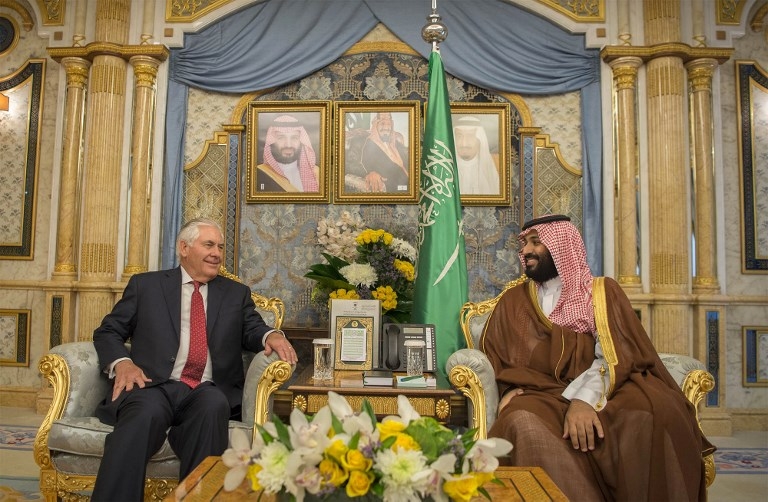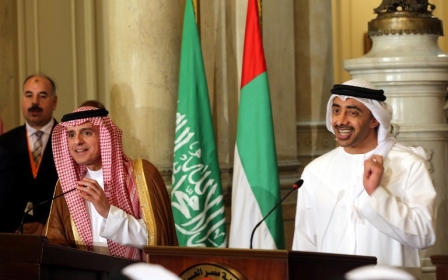Tillerson leaves Gulf with no end in sight to Qatar crisis

US Secretary of State Rex Tillerson on Thursday wrapped up a four-day mission to the Gulf with little sign of progress in resolving the diplomatic crisis pitting Saudi Arabia and its allies against Qatar.
Tillerson met Qatar's Emir Sheikh Tamim bin Hamad al-Thani for the second time in 48 hours, together with a Kuwaiti mediator, on the final leg of his trip, before heading back to Washington.
Despite an intense round of shuttle diplomacy that also took him to Kuwait and Saudi Arabia, tensions remained high between Qatar and four Arab states that accuse Doha of supporting extremism and being too close to their arch-rival Iran.
The diplomatic slack now appears likely to be picked up again by the Europeans, with French Foreign Minister Jean-Yves Le Drian heading to the region at the weekend.
A French diplomatic source in Paris said that Le Drian would try "to recreate confidence, create an interest of all parties to engage in de-escalation".
"We must find a way out."
Le Drian's visit will follow similar trips made by his counterparts from Germany and Britain in recent weeks.
Saudi Arabia, the United Arab Emirates, Bahrain and Egypt have imposed a boycott on Qatar since 5 June.
They have imposed sanctions on Doha, including closing its only land border, refusing Qatar access to their airspace and ordering their citizens back from Qatar.
They also presented the emirate with a list of 13 demands with which to comply to end the worst political crisis in the region for years.
Qatar denies the charges of extremism and called the demands "unrealistic".
Human rights violations
It also claims the boycott has led to human rights violations, and on Thursday one group said abuses were one consequence of the crisis.
"Hundreds of Saudis, Bahrainis, and Emiratis have been forced into the impossible situation of either disregarding their countries' orders or leaving behind their families and job," said Sarah Leah Whitson of Human Rights Watch.
Tillerson arrived back in Doha after meeting Saudi Arabia's King Salman and Crown Prince Mohammed bin Salman 24 hours earlier.
On his previous visit on Tuesday, the US and Qatar signed an agreement to combat terror funding, subsequently dismissed as "insufficient" by the Saudi-led states.
The United States, a longtime ally of Sunni-ruled Saudi Arabia, has given mixed signals about its policy on the Gulf crisis.
While President Donald Trump welcomed the Arab states' decision to sever air and land links to their gas-rich neighbour, the State Department has taken a more neutral position and Tillerson has sought to broker a diplomatic solution.
The crisis has presented Tillerson, well known in the Gulf from his former role as chief of energy giant ExxonMobil, with his first big challenge as Washington's top diplomat.
Speaking after meeting with Prince Mohammed - the Saudi king's son and a highly influential figure in regional politics - Tillerson stressed the two countries shared a "strong partnership".
The United States and its Western allies have vast economic and political interests in the Gulf, which pumps one fifth of the world's oil supplies.
The US - including Tillerson - likely sees significant strategic and lucrative benefits to any long-running stand-off between these states
- Christopher Davidson, Middle East expert
While Saudi Arabia is a key US ally, Qatar is home to the US military's largest air base in the region, al-Udeid. Rival Bahrain houses the US Navy Fifth Fleet.
On Tuesday, speaking in Doha, Tillerson described Qatar as being "reasonable" in its dispute with the four states.
But an ongoing crisis may not be looked upon as such a bad thing in the West, at least according to one analyst.
"For public consumption at least, the US State Department is trying to send out a signal that it has worked hard with its three allies - Saudi, UAE, Qatar - to try to find a mutually agreeable solution," Christopher Davidson, an expert on Middle East politics at Britain's Durham University, told AFP.
"Britain, and now France, are also trying to do much the same.
"Underneath the surface however... the US - including Tillerson - likely sees significant strategic and lucrative benefits to any long-running stand-off between these states."
Middle East Eye propose une couverture et une analyse indépendantes et incomparables du Moyen-Orient, de l’Afrique du Nord et d’autres régions du monde. Pour en savoir plus sur la reprise de ce contenu et les frais qui s’appliquent, veuillez remplir ce formulaire [en anglais]. Pour en savoir plus sur MEE, cliquez ici [en anglais].




